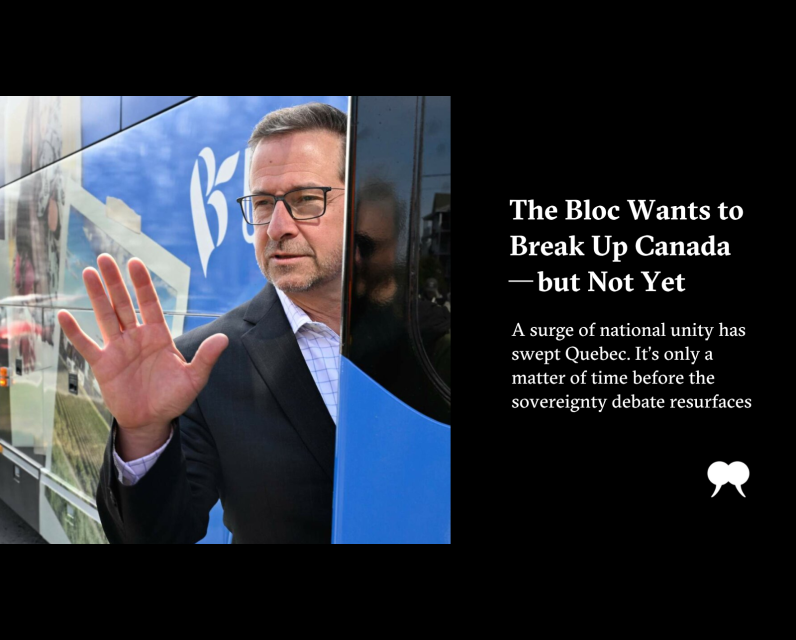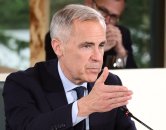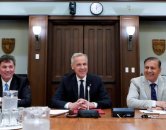Source Feed: Walrus
Author: Toula Drimonis
Publication Date: July 9, 2025 - 06:30
The Bloc Wants to Break Up Canada—but Not Yet
July 9, 2025

In the final days of a high-stakes federal campaign, Bloc Québécois leader Yves-François Blanchet made his feelings known regarding the country whose Parliament he sits in. “We are, whether we like it or not,” he said, “part of an artificial country with very little meaning, called Canada.”
Quebecers weren’t buying it. The Bloc is a federal party that exists to promote Quebec interests and, ultimately, its independence. Voters not only viewed Canada as a real country but they saw it as worth saving from the territorial clutches of US president Donald Trump. The province overwhelmingly rejected the Bloc’s ethnic nationalism and rallied around Mark Carney’s Liberals and a unified effort against American overreach. If economic fears loomed larger for Quebec voters, it came with the recognition that anything that undermined Canadian sovereignty would erode the province’s own cultural and linguistic protections.
Going into the April 28 election, the Bloc held thirty-three seats in the House of Commons, surpassing the New Democratic Party, which had been in a supply-and-confidence agreement with the government. By the end of the night, the Bloc was left with twenty-two, losing a third of its caucus. The Liberals swept Quebec with forty-three seats—their best provincial showing in decades.
But while the Bloc is down, it would be foolish to count them out. The dream of Quebec independence may ebb and flow, but it doesn’t vanish. The Bloc remains a relentless steward of that ideal.
Founded in 1991 by Lucien Bouchard, a cabinet minister in the federal Progressive Conservative government of Brian Mulroney, the Bloc began as a coalition of Quebec Conservative and Liberal MPs who defected from their parties in the wake of the Meech Lake Accord’s collapse. Designed to address Quebec’s long-standing grievances over the 1982 Constitution Act—imposed without its approval and silent on its distinct status—the accord ultimately failed when Manitoba and Newfoundland blocked its passage.
The failure had multiple causes, but to many Quebecers, it felt personal—a rejection of who they were. For more than three decades, the Bloc has given those voters a clear alternative: a federal party that answers first to the province. In those years, the Bloc has shown that it can wield outsized influence by shaping narratives, dominating French-language media, and forcing Parliament to respond to Quebec-specific issues.
The Bloc pressures Ottawa with ultimatums, demands exemptions from federal laws, and pushes for more provincial control over issues like immigration. In minority federal governments, it leverages its influence to extract concessions. Unlike all other federal parties, the Bloc runs candidates only in Quebec and has drawn most of its support from largely francophone or rural ridings, rarely making major inroads in the multicultural city of Montreal.
What the Bloc sometimes lacks in seats, it makes up for in stagecraft, carefully choreographed by its current leader. Former legislator and once president of an artist management firm, Blanchet is part tactician, part provocateur. He understands politics as performance, and he’s good at leveraging press conferences and campaign events for comments that get broad media pickup.
Blanchet took over the party in 2019, after running unopposed. Under his leadership, the party grew from ten seats in the House of Commons in 2015 to thirty-two in 2019. Despite the latest trouncing, Blanchet held onto his riding of Beloeil—Chambly. It’s unlikely he’ll be challenged. In a 2023 confidence vote, he secured a commanding 97 percent.
The Bloc’s broader fate, however, often turns on forces far beyond any leader’s control. The latest election results are reminiscent of the NDP’s orange wave in 2011, which all but wiped out the Bloc. The casualty of a stale sovereignty message, voters craving federal relevance, and leader Gilles Duceppe’s failure to blunt the NDP’s momentum, the Bloc dropped to just four seats. In 2015, when Justin Trudeau’s Liberals won, the Bloc inched up to ten seats, but Duceppe lost his own.
Blanchet is no Duceppe. He’s savvier, for one. He knows how to punch above his party’s political weight with caustic, bravado-laced jabs. He also knows when to change tack. Blanchet saw what was plain to everyone: Quebecers gravitated toward the party they saw as best equipped to stand up to Trump.
In response, he’s called for a “partisan truce” with other federal leaders, pledging to collaborate with the new Liberal minority government. “The federalist parties and us, who are indépendantiste, must be capable of working together in the face of a crisis,” Blanchet said, according to the Montreal Gazette. Blanchet says he’s content to be a good partner, if Canada in turn respects Quebecers’ interests.
The move irritated the provincial Parti Québécois, which has had close ties to the Bloc as both share the goal of independence. Worried the Bloc’s approach legitimizes a federal adversary, PQ leader Paul St-Pierre Plamondon urged Blanchet to return to his “separatist roots.”
For the Bloc, tension with the PQ matters less than the mood of Quebec voters. And it’s a mood the Bloc has experience reading.
The province’s political landscape is famously unpredictable. The party understands they have long served as Quebec’s protest vessel of choice. It exists less to govern than to remind Ottawa that nous autres are different: French speaking, culturally distinct. It leans into this role with proudly fuzzy messaging that says everything and nothing. From 2019’s “Quebec is us” to 2021’s “We are Quebeckers” to this year’s “I choose Quebec,” its slogans don’t add up to a platform. They’re a vibe.
When times are normal in Quebec, that vibe can translate into defiance. But when national unity emerges as the best shield against global instability, sovereigntist rhetoric starts to sound like a luxury. Sensing the shift, Carney tried to co-opt the secessionist brand, promising to “relentlessly defend the French language and Quebec culture,” which he called “the heart of Canadian identity.” In other words, the best way to beat the Bloc may be to out-Bloc them.
But it’s important not to misread the Bloc’s electoral losses as anything other than a reflection of political tides. The Bloc’s support rises when Quebecers feel ignored or disrespected—especially around issues of language, identity, or autonomy. It takes only a federal misstep (a court ruling, an immigration policy, a pipeline project) for sovereignty to re-enter the mainstream conversation, and the Bloc will pounce. This time, Trump sealed the Bloc’s fate. But the Bloc doesn’t need a majority to matter. It just needs a moment. And Canadian politics always, eventually, gives it one.
For now, Quebec’s push for sovereignty is on hold. The irony? It’s Alberta that’s now toying with the idea of secession. Asked if he had any advice for Alberta separatists, the Bloc leader couldn’t resist one of his signature jabs: “The first idea is to define oneself as a nation. Therefore, it requires a culture of their own. And I am not certain that oil and gas qualify.”The post The Bloc Wants to Break Up Canada—but Not Yet first appeared on The Walrus.
Calgary police say they are investigating after three people were seriously hurt in an assault at the Calgary Stampede.Police say they responded to reports of an assault just after 11 p.m. Tuesday near the Euroslide on the Stampede’s midway.
July 9, 2025 - 09:32 | | The Globe and Mail
The federal government is launching a "red tape review" with the hope of eliminating "outdated and overcomplicated regulations" to boost economic growth. Read More
July 9, 2025 - 09:30 | Matteo Cimellaro | Ottawa Citizen
Prime Minister Mark Carney is enacting a cross-departmental review of all regulations starting Wednesday, a measure he promised during the federal election campaign.
July 9, 2025 - 09:00 | | CBC News - Ottawa



Comments
Be the first to comment